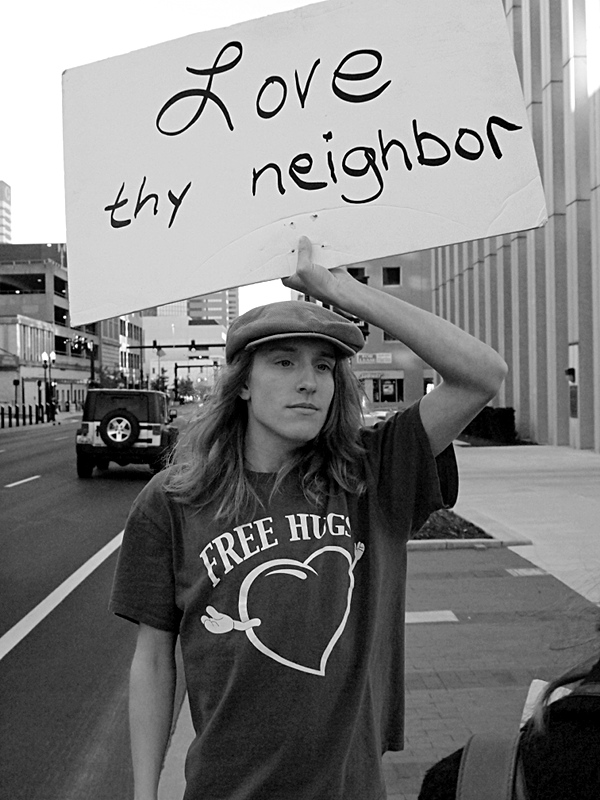From the Occupied Lexington Herald:
Be good to each other
By Ian Epperson
We have a bad habit of taking Jesus and molding him into someone who agrees economically with what we already believe. We do this with the Bible too. A die-hard opponent of welfare can find the passage “if a man doesn’t work he doesn’t eat.” A socialist or communist can find “no one considered anything to be their own but shared everything in common.” A charitable person can find John the Baptist saying, “He who has two tunics should give to him with none, and the one with food should do the same.”
There is a problem, however, with our desire to mold Jesus into our economic ideologies. He then becomes unable to change us, since he stands only to reinforce our already held beliefs.
When we take the scriptures as a whole, we can’t find any popular economic model today that Jesus would endorse. What we find instead is a consistent message that has to do not only with economics, but also with our more intimate lives. That message is simple and can be summed up thusly: “Love your neighbor as yourself.” In other words, be good to each other. So let me not drone on about the pros and cons of any particular economic system but instead talk about being good to each other, and being good to each other as a business model.
We all have a picture in our head of what it looks like to be good to each other in a business setting. We think of a small community bank giving its customers a break when hard times come along, renegotiating loans after a medical emergency or a cut in hours at work. It is not necessarily the best business model if your only goal is to make as much profit as possible. But if you are interested in the being-good-to-one-another business model, it’s the only thing that makes sense.
Companies abiding by this business model are the stuff of legends in many American cities and small towns. In my hometown, for example, there’s a funeral home whose founder never let a poor farmer pay for a funeral during the depression; eighty years later, we still remember how this business treated the least of these in those hard times.
Sadly, as a company grows it has to be accountable to shareholders who are located further and further from the smaller communities that gave rise to the business. It must be tempting to stray from the being-good business model and toward the model whose over-riding interests involve maximizing profits. In that race to the top, as the number of customers increases and those customers who were once names and faces become numbers, the pursuit of profit gradually overrules and overwhelms the desire to be good to our neighbors.
As businesses have increasingly moved away from providing a commerce based (at least in part) on neighborly relations in favor of one based primarily on economic ones, we encounter many of the world’s most pressing problems: sweatshops, climate change, the concentration of wealth in so few hands. The problem is not which economic system we adhere to. It is that regardless of the economic system, we have forgotten how to be good to each other. We have forgotten how to love our neighbor as ourselves.
As we stray from this basic relationship that Jesus provided us, any number of rationalizations begin to seem reasonable. As the be-good business model diminishes and the maximizing-profit business model takes hold, the result is often a frenzied rush to secure greater and greater profits, a race to the top that disregards anything that doesn’t generate an attractive return on investment.
As the pursuit of profit takes hold, should we then be surprised that the symbol of Wall Street is a 3,700 pound bronze bull at the corner of Morris and Broadway in downtown Manhattan, eerily reminiscent of the golden calf the people of Israel built in Moses’ absence as they wandered the desert for forty years.
Once Moses stood up to Pharaoh it didn’t take long for the people of Israel to get out of Egypt. But it took forty years to get Egypt out of them. In the same way, a conversation is happening in cities across the world as we discuss how to get out of Wall Street, and more importantly how to get Wall Street out of us. We hope you’ll come join the conversation. We hope you’ll come out and stand up with us for the be-good business model.





Leave a Reply